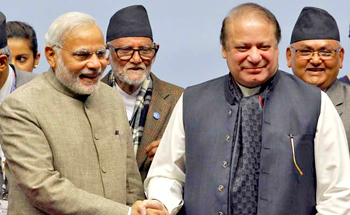New Delhi, Mar 23: Prime Minister Narendra Modi on Monday extended greetings to his Pakistani counterpart Nawaz Sharif on the occasion of 'Pakistan National Day' and called for a bilateral dialogue between New Delhi and Islamabad in a terror and violence free atmosphere.
“I have written to Pakistan PM Mr Nawaz Sharif, conveying my greetings on the National Day of Pakistan,” Prime Minister Modi tweeted.
Pakistan Day commemorates the Lahore Resolution of 1940 and the adoption of the first constitution of the country during its transition into an Islamic Republic on March 23, 1956.
 The resolution called for the creation of independent states for Muslims in north-western and eastern British India.
The resolution called for the creation of independent states for Muslims in north-western and eastern British India.
Earlier in the day, Pakistan's High Commissioner to India Abdul Basit said that his country is keen to settle all issues with India, including the disputed issue of Jammu and Kashmir through dialogue, and underlined the importance of both countries working together for both peace and development.
Congratulating all Pakistani nationals residing in India on the occasion of Pakistan Day, High Commissioner Basit presided over an impressive flag hoisting ceremony at the Pakistan High Commission in New Delhi, and said that the creation of Pakistan within seven years of the passage of the 1940 Lahore Resolution reflected the wisdom and tenacity of that country's founding fathers.
"Under the impeccable and sagacious leadership of Quaid-e-Azam Mohammad Ali Jinnah, the Muslims of the subcontinent realized their dream. It was now incumbent upon us to make Pakistan a truly welfare state as envisioned by the Quaid-e-Azam," he said.
Referring to Pakistan-India relations, the High Commissioner underlined the importance of Prime Minister Nawaz Sharif's vision of "Peace for development and development for peace."
He further said that peace was in the mutual interest of Pakistan and India and that it was now high time to normalize relations and usher in a new era of peace and stability, enabling the two countries to address the challenges facing our region and exploiting myriad of opportunities unleashed by globalization.





Comments
Add new comment